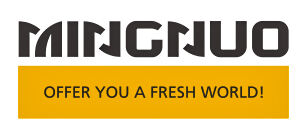Kada je riječ o odabiru najboljeg litijeva baterija za vašu mašinu za čišćenje podova, radi se o više nego samo o najvećoj snazi ili najdužem vremenu rada. Zaista se radi o tome što je najbolje za vaše posebne potrebe i način korištenja vaše mašine. Ako upravljate uslugom čišćenja koja obavlja posao u kupovnim centrima, bolnicama ili zračnim lukama, pogrešan akumulator vam može izazvati zastoje, više održavanja ili čak zamjenu dugoročno prije nego što bi to trebalo biti nužno. Naprotiv, pravi akumulator može učiniti da se stvari odvijaju glatko i učiniti da vam posao bude pouzdaniji. Ovaj vodič će vam pokazati što je zaista važno prilikom odabira litijevog akumulatora, kako biste spriječili da vaša mašina za pranje podova radi previše sati, a vi dobijete glavobolje.

Zašto je odabir baterije važan kod opreme za čišćenje podova?
U mašine za čišćenje podova , baterija je više od izvora energije - to je životna krv operacije. Pogrešna baterija može dovesti do sporog rada, ograničenog vremena rada, preranog kraja trajanja i kratkih spojeva. Na primjer, ako koristite mašinu za čišćenje podova u velikom skladištu i baterija iznenada umre usred procesa, vaš raspored čišćenja je poremećen, a troškovi rada povećani. Naprotiv, kvalitetna litijumska baterija omogućava duže vrijeme rada i brže punjenje u poređenju s tradicionalnim olovo-kiselim baterijama, često i više ciklusa punjenja.
Još jedan važan razlog zašto je odabir baterije važan su sigurnost i održavanje. S druge strane, radi se o električnim baterijama. ne zahtijevaju iste redovne provjere vode (i povremene duboke pražnjenja) kao druge baterije, što ih čini praktičnijima za zaposlene timove. Također su lakše, što može pomoći u smanjenju opterećenja na motor i kotače stroja. Znači manje trošenja odmah na prvi pogled, zar ne? A ako vaša ekipa radi po rotacijskom rasporedu smjena ili radi 12-satne smjene, baterija koja podržava brzo punjenje ili punjenje po prilici može smanjiti vrijeme bez aktivnosti i mrtvo vrijeme.
U stvarnom svijetu poput bolnica, zračnih luka, hotela – stvari se moraju brzo i bez prekida čistiti. Neispravna ili pogrešna baterija pregrijavala bi se, gubila naboj brže ili se češće morala zamijeniti – sve što bi uzrokovalo nepoželjne prekide. Imati pravu bateriju važno je ne samo zbog učinka, već i da biste zadržali glatko funkcioniranje vaše operacije, kontrolu troškova i učinkovit rad vašeg tima. Dakle, iako izgleda kao da je samo jedan mali dio stroja, važnost baterije je veća nego što većina ljudi shvaća.

Litij vs. olovo-kiselina: Koja baterija je bolja za čistače podova?
U slučaju s druge strane, radi se o električnim baterijama. u usporedbi s tradicionalnim olovo-kiselim baterijama za čistače podova, morate razmotriti kako koristite svoj stroj iz dana u dan. Kao i sve drugo, svaka vrsta baterije ima svoje prednosti i nedostatke, ali za mnoge komercijalne usluge čišćenja, litij se pokazuje kao bolji izbor.
Takvi uređaji postoje već jako dugo i još uvijek se koriste u starijim strojevima. Često su jeftiniji na početku, a mogu biti izdržljivi, ali zahtijevaju više održavanja. Redovito morate provjeravati razinu vode, ne smijete ih pretjerano puniti te ih ostaviti da se ohlade nakon punjenja. Ako zanemarite bilo koji od ovih koraka, njihov vijek trajanja može naglo opasti. Također su nezgrapni i teški, što dodatno opterećuje čistač.
S druge strane, radi se o električnim baterijama. nasuprotno su moderniji uređaji za praktičnost. Također, punjenje traje znatno kraće, često samo nekoliko sati, i ne zahtijevaju toliko pažnje. Nema potrebe za dolijevanjem vode niti izjednačavanjem naboja. Osim toga, dizajnirani su za 'punjenje prilikom prilike', što znači da ih možete priključiti za kratke termine tijekom pauša, bez oštećenja baterije. Ako vaš tim radi dugačke smjene ili čisti više lokacija dnevno, to je velika prednost.
Još jedan ključni faktor je vijek trajanja. Dobar litijevi akumulator može trajati i do 2–3 puta dulje od olovnog akumulatora, što u nekoj mjeri nadoknađuje skuplju kupovinsku cijenu. Na kraju ćete ipak uštedjeti na zamjenama i prestojima. Oni su također i lakji, što doprinosi duljem vijeku trajanja dijelova stroja.
Međutim, ako imate ograničeni budžet i koristite stroj samo za lagano i povremeno čišćenje, olovni akumulator će biti dovoljan. No za prostore s velikim opterećenjem i minimalnim održavanjem poput tržnica, bolnica ili velikih uredskih zgrada, litij ima jasnu prednost.
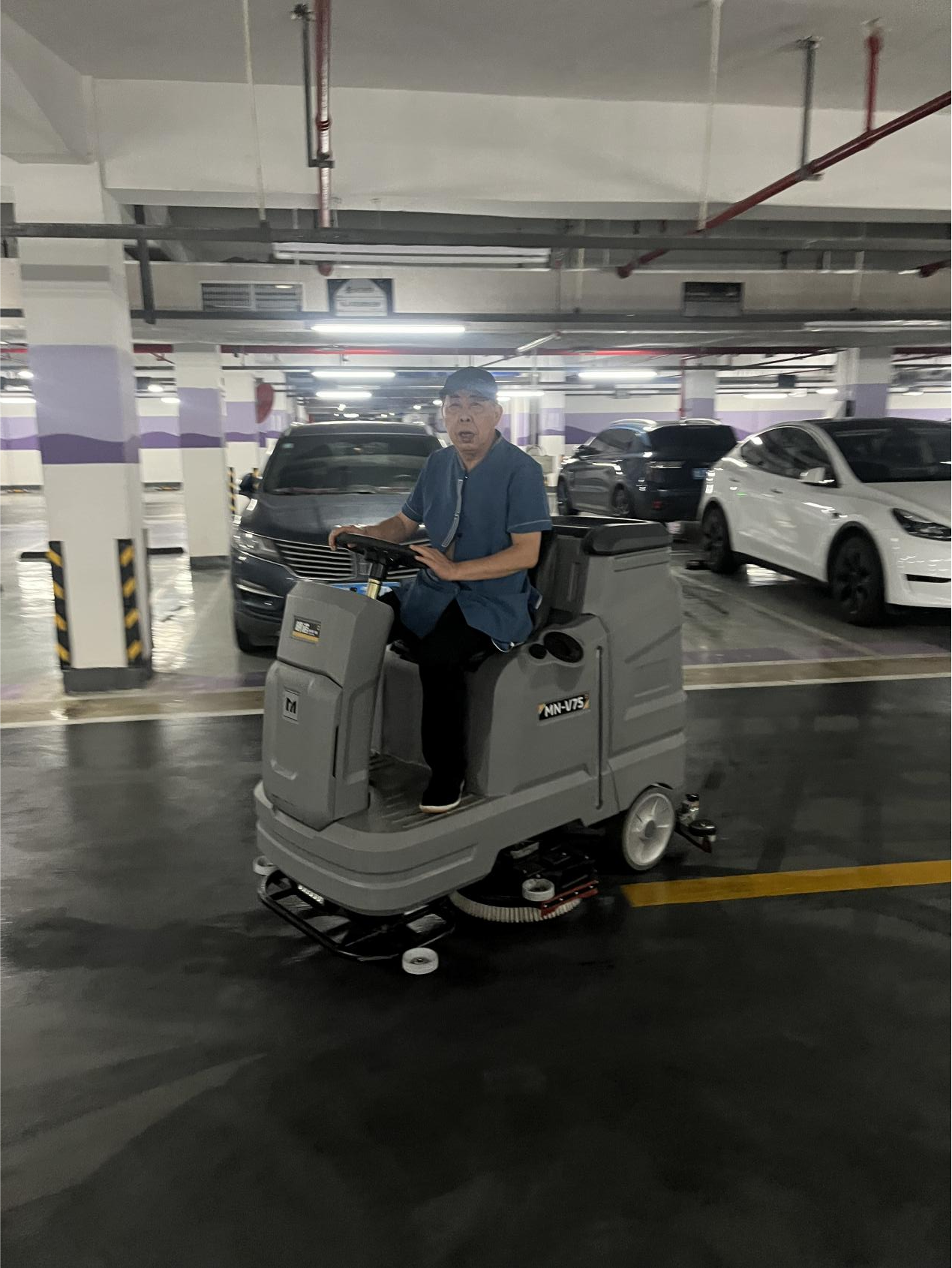
Ključne napomene pri odabiru litijevog akumulatora.
Kada tražite litijeva baterija za vaš stroj za čišćenje podova, lako se izgubiti u tehničkim izrazima. No, idealna odluka ovisi više o nekoliko praktičnih čimbenika koji će utjecati na vašu svakodnevnu upotrebu i troškove, a naročito na vašu sigurnost. Evo na što trebate obratiti pozornost:
Napon i kompatibilnost: Prva stvar prva, provjerite je li baterija kompatibilna s naponom vašeg uređaja, koji je obično 24 V, 36 V ili 48 V, ovisno o modelu. U najgorem slučaju, oštetit ćete motor ili skratiti vijek trajanja baterije. Ako niste sigurni, provjerite korisnički priručnik ili se obratite trgovcu za savjetom.
Kapacitet (Ah) i trajanje rada: Evo što trebate znati: kapacitet će biti prikazan u amper-satima (Ah) i utjecat će na to koliko dugo vaša mašina za čišćenje može raditi prije nego što treba punjenje. Duže trajanje rada znači veći Ah, što je posebno važno ako čistite veće prostore ili radite dulje smjene. Na primjer, ako usisavate foaje hotela i hodnike 3–4 sata, želite bateriju koja neće se isprazniti prije nego što završite posao.
Brzina punjenja: Neki litijevi akumulatori mogu se puniti već za 2 sata ili čak manje, ali može trajati i nekoliko sati. Vrijeme punjenja od jednog sata ili kraće, ili mogućnost punjenja povremeno između smjena, može pomoći da proizvodnja teče bez prekida, ako vaš tim ima stroge rasporede čišćenja ili ako oprema radi non-stop.
Sigurnosne značajke: Akumulator bi trebao uključivati BMS (sustav za upravljanje baterijom) radi veće sigurnosti. Ova značajka štiti od pregrijavanja, prekomjernog punjenja, kratkih spojeva i drugih problema. Također pomaže u ravnomjernom punjenju ćelija radi duljeg vijeka trajanja baterije. Sigurnost nije samo luksuz, ona je ključna, pogotovo ako mašine rade non-stop na javnim mjestima.
Jamstvo i podrška: Nijedna baterija nije savršena, pa nemojte panikariti ako naiđete na probleme. Dobre jamstvo, idealno tri godine ili više, i brza tehnička podrška mogu vam uštedjeti vrijeme i smanjiti stres ako se nešto pokvari.
Dobro ime: Dakle, držite se brendova koji imaju dobar glas u komercijalnom čišćenju. Oni obično imaju bolju kontrolu kvalitete i manje su usmjereni na prodaju naknadnih usluga. Zatražite preporuke ili kontakte drugih operatera s kojima možete razgovarati.
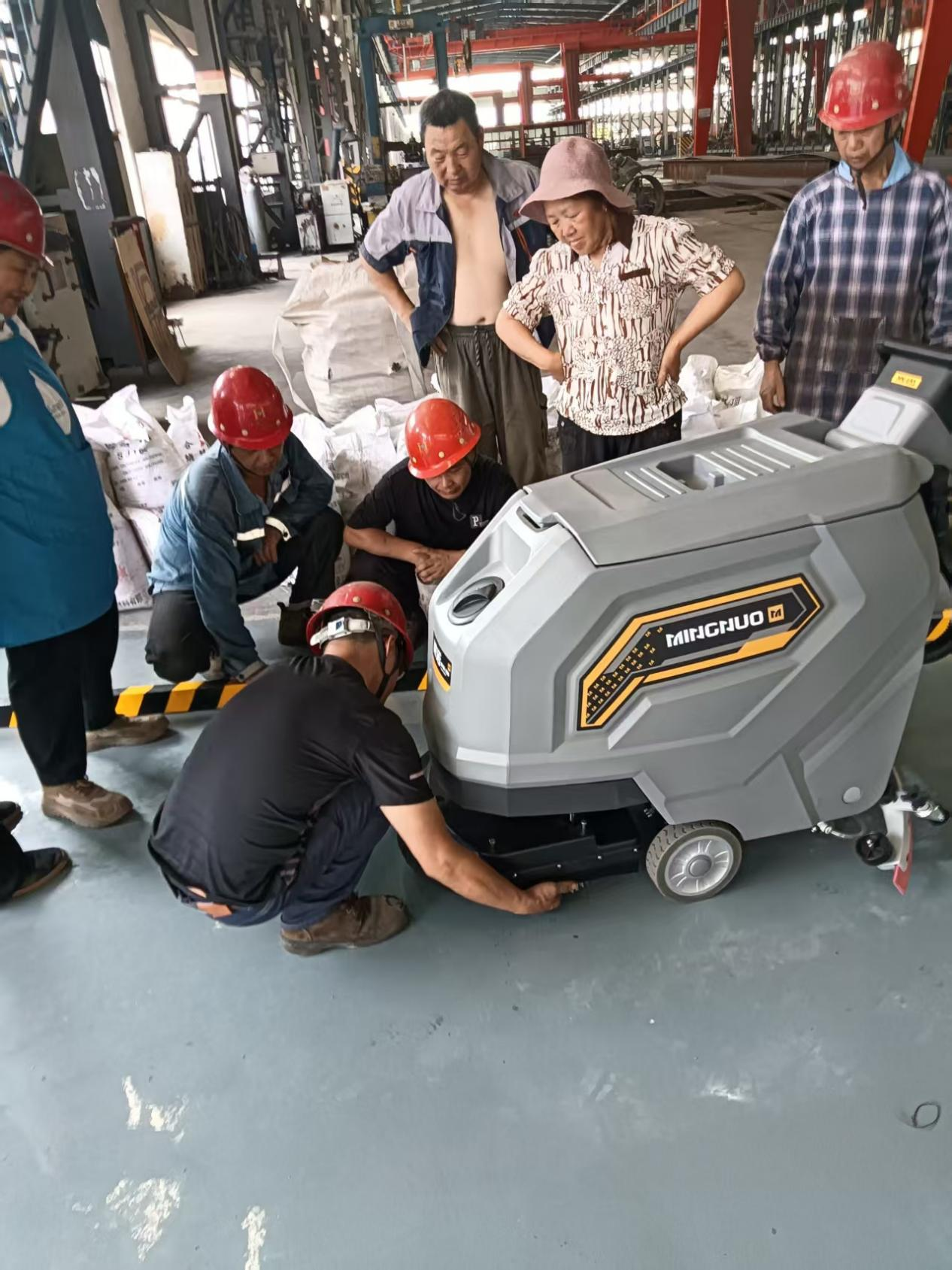
Prednosti litijevih baterija za strojeve za pranje podova.
Ručni strojevi za pranje podova opremljeni litijevim baterijama nude niz prednosti za tvrtke koje zahtijevaju pouzdanu učinkovitost i manje ometanja. Za razliku od zaostalih tipova baterija, dizajnirani su za mobilnost, udobnost, učinkovitost i dugoročnu vrijednost. Evo zašto ima smisla birati ih:
Dugo trajanje rada i brzo punjenje: Čistače za vođenje za nogama češće se koriste za čišćenje srednjih i velikih komercijalnih objekata poput škola, bolnica, trgovina. MN-V53 ima izuzetno dugo trajanje energije i brzo punjenje, što ga čini boljim izborom za čišćenje velikih prostora. Litijeve baterije traju više od 4 sata na jedno punjenje, što znači da ih ne morate punuti usred posla. U usporedbi, ista olovo-kiselinska baterija od 24V 125AH traje 6-8 sati. Stoga biste trebali odabrati litijeve baterije marke Mingnuo, iako možda nećete ni primijetiti da koristite najnapredniju baterijsku tehnologiju. Međutim, istina je da to nećete saznati dok ih ne isprobate, a ako vaš tim radi pod pritiskom rokova, to će vam uštedjeti dosta vremena.
Lagana konstrukcija: Litijeva baterija je lakša od tradicionalne baterije. To čini vašu mašinu lakšom za guranje i smanjuje opterećenje na motoru, što smanjuje trošenje. Ako vaši zaposlenici koriste takve čistače svakodnevno, bit će zahvalni za ovu energijski učinkovitu primjenu, posebno tijekom dugih smjena.
Niska potreba za održavanjem: Nema potrebe za provjeravanjem razine tekućine, čišćenjem terminala ili oživljavanjem istrošenih baterija. Litijeve baterije su bez održavanja i hermetički zatvorene. To znači manje prekida i smanjeni rizik od kvara zbog propuštenog održavanja.
Sigurniji i pametniji sustav upravljanja baterijom (BMS): BMS (sustav upravljanja baterijom) osigurava maksimalnu zaštitu od prekomjernog punjenja, pražnjenja i kratkog spoja, omogućavajući sigurniju i pouzdaniju operaciju. Ovo ne samo da produžuje vijek trajanja baterije, već također štiti uređaj i korisnika.
Duži vijek trajanja: Iako litijevi akumulatori mogu biti skuplji na početku, oni mogu trajati dvostruko duže ili čak više nego olovo-kiseli akumulatori. Čak i u kratkom roku, to se zbraja u stvarne uštede, posebno ako se doda manji broj zamjena i manje vremena bez rada.
Zašto naša rješenja s baterijama ističu?
Kada birate bateriju za vašu mašinu za čišćenje, trebali biste imati onu koja vam omogućuje da održavate stalnu brzinu rada. Naši litijevi akumulatori projektirani su s obzirom na stvarno čišćenje, tako da traju, brzo se punjenju i ostvaruju maksimalnu učinkovitost tijekom cijelog vijeka trajanja proizvoda. Nije važno da li čistite školski hodnik, bolnički pod ili trgovinski prostor - naše baterije dizajnirane su tako da traju bez potrebe za stalnim održavanjem.
Naše baterije ističu se i prema još jednoj ključnoj mjeri: pouzdanosti. Osim toga, svaka od njih ima inteligentan sustav za upravljanje baterijama (BMS) koji sprječava uobičajene probleme poput prekomjernog punjenja, pregrijavanja ili kratkog spoja. To znači manje iznenađenja na poslu i više vremena za stvarno čišćenje. Također, kontinuirani izlazni napon osigurava da vaša mašina radi uvijek u najboljim uvjetima tijekom radnog vremena, bez pada snage usred osmočasovne smjene.
Također želimo olakšati korištenje uređaja. Naše baterije mogu se brzo puniti za 2 sata ili kraće i moguće je dopunjenje energije u kratkim stajanjima. To je idealno za posade koje nemaju dugo vremena između smjena ili za vrijeme kraćih stanaka kada nema vremena za zamjenu uređaja. Još bolje? Budući da su bez održavanja, vaša posada neće trošiti vrijeme na dolijevanje vode niti provjeravanje razine kiseline.
Trajnost je još jedna velika prednost. Naše litij-ionske baterije dizajnirane su da izdrže tisuće ciklusa punjenja. To znači da više nećete morati svake godine mijenjati baterije ili se suočiti s naglim kvarom usred zahtjevnog posla. Uz dobru garanciju i pouzdanu tehničku podršku, nije teško razumjeti zašto sve više operatera prelazi na njih.
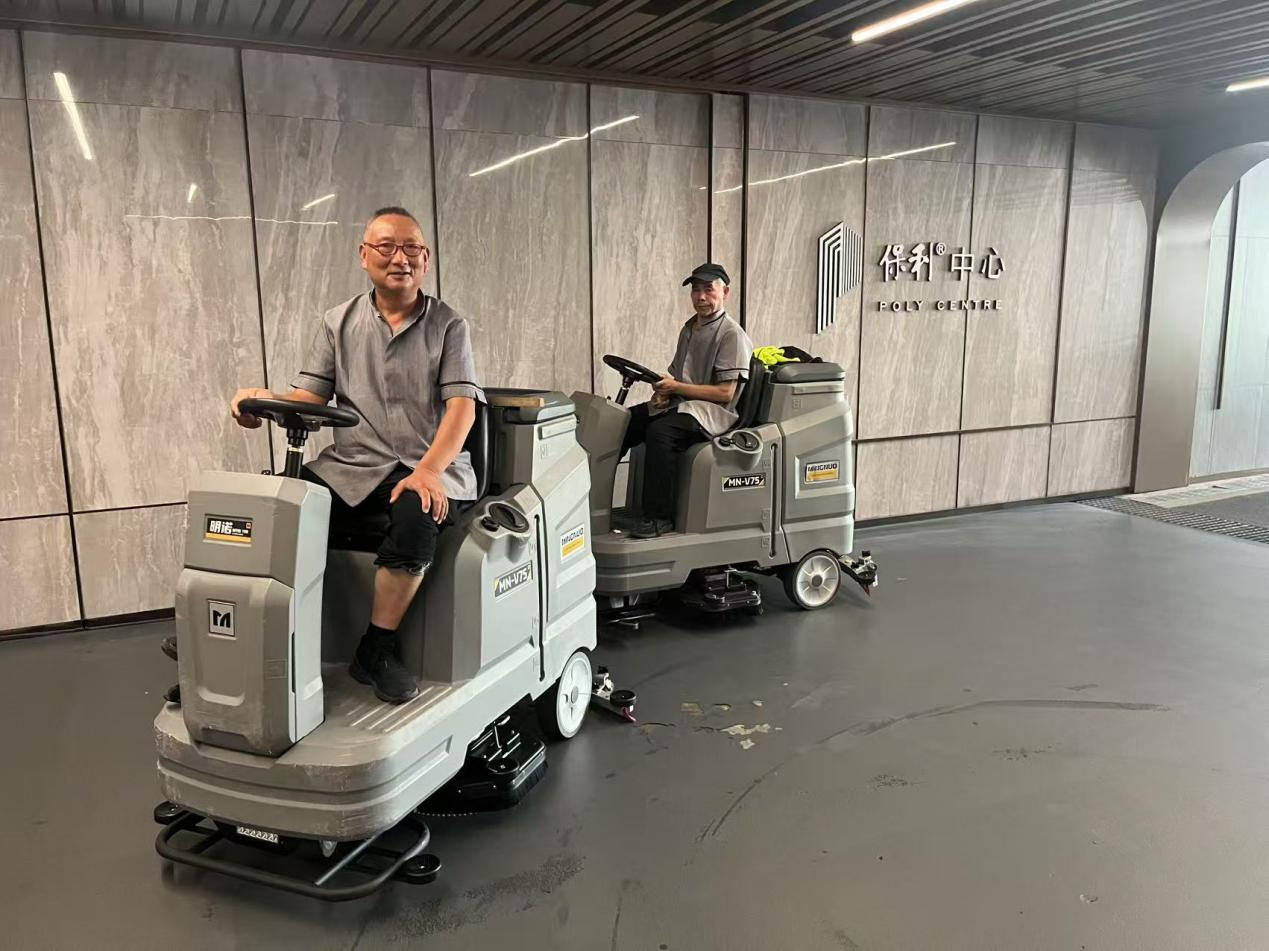
Najbolje prakse za održavanje i skladištenje baterija.
Briga o litij-ionskoj bateriji nije teška, ali ako se točno pridržavate uputa, to može znatno utjecati na njezin vijek trajanja i učinak. Bilo da čistite svakodnevno ili samo par puta tjedno, nekoliko jednostavnih koraka može vam pomoći da izbjegnete najčešće probleme i uštedjeti novac na duži rok.
Pravilno punjenje: Uvijek koristite punjač koji je isporučen uz vašu bateriju ili onaj koji je odobrio proizvođač. Na primjer, nemojte ostavljati bateriju priključenu danima: Kada se potpuno napuni, isključite je. Nema potrebe da potpuno ispraznite litij-ionsku bateriju prije ponovnog punjenja. Zapravo je najbolje da je dopunite kad god možete, posebno ako vaši zaposlenici rade u smjenama i ako ih trebate brzo vratiti u upotrebu.
Jednostavno je čist i suh: Nakon redovne uporabe, očistite kućište baterije kako biste osigurali da se tamo ne zadržala prašina ili vlaga. Ako je baterija mokra, osušite je prije ponovnog punjenja. Također, budite oprezni da ne koristite stroj u stajatićoj vodi ili vrlo vlažnim prostorima, jer prekomjerna vlažnost štetna je za bateriju (kao i za elektroniku čistača).
Pratite temperaturu: Ekstremna toplina ili hladnoća mogu utjecati na vijek trajanja baterije. Pokušajte puniti i čuvati bateriju na mjestu gdje je temperatura između 10°C i 30°C (50°F i 86°F). Ne punite je odmah nakon upotrebe ako vam se baterija čini vrućom, prvo je neka se malo ohladi.
Pametno ju je čuvati: Ako ne planirate koristiti uređaj neko vrijeme, čuvajte bateriju s 50% naboja. To pomaže u zaštiti staničnih elemenata baterije. Čuvajte je na suhom mjestu, izvan izravnog svjetla ili ekstremne hladnoće. Ako ju čuvate dulje od mjesec dana, provjeravajte je svakih nekoliko tjedana i po potrebi dopunite naboj.
Redovito provjeravajte: Provjerite ima li oznaka trošenja, nadimanja ili puknuća na kućištu. Ako primijetite nešto neobično, prestanite ju koristiti i obratite se službi za podršku. Rano uočavanje problema može vas zaštititi od moguće štete na uređaju ili prekida rada tijekom vršnog vremena.
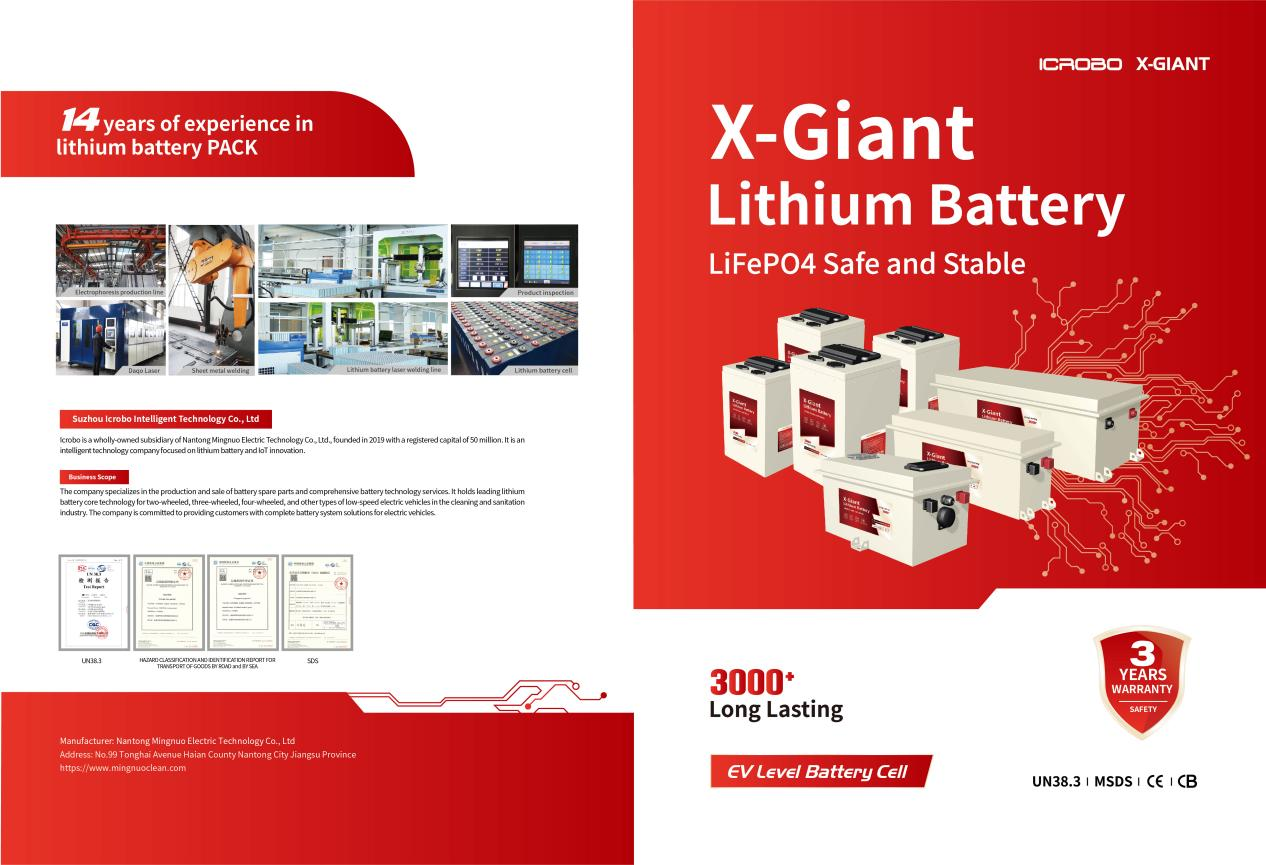
Uložite u pravu bateriju za učinkovito čišćenje.
Odabir ispravne baterije nije sitnica, to je jedna od onih velikih odluka koje u budućnosti mogu uštedjeti puno vremena, puno novca i izbjeći mnoštvo glavobolja. Kvalitetna litijeva baterija znači da će vaš stroj za čišćenje podova dulje raditi između punjenja, brže se punjenja i zahtijevati puno manje održavanja u usporedbi s baterijama starijeg tipa. To znači manje prekida tijekom radnog dana i više vremena posvećenog kvalitetnom obavljanju posla.
Ako ste poslodavac s timom koji upravljate, imat ćete manje glavobolja povezanih s glatkim izmjenama smjena, vrijemena kada stroj ne radi i pritužbama o sporim i nepredvidivim uređajima. A ako ste samostalni izvođač, želite imati povjerenja da će vaš stroj držati korak s vama, a ne usporavati vas.
Na kraju, kupnja visokokvalitetne litijeve baterije osigurat će da vaša operacija čišćenja ostane učinkovita, pouzdana i spremna za bilo kakve izazove koje taj dan može donijeti. Brinete li se o njoj, ona će se brinuti o vašim podovima – smjena za smjenom.
Sadržaj
- Zašto je odabir baterije važan kod opreme za čišćenje podova?
- Litij vs. olovo-kiselina: Koja baterija je bolja za čistače podova?
- Ključne napomene pri odabiru litijevog akumulatora.
- Prednosti litijevih baterija za strojeve za pranje podova.
- Zašto naša rješenja s baterijama ističu?
- Najbolje prakse za održavanje i skladištenje baterija.
- Uložite u pravu bateriju za učinkovito čišćenje.
 EN
EN
 AR
AR
 BG
BG
 HR
HR
 NL
NL
 KO
KO
 NO
NO
 PL
PL
 PT
PT
 RO
RO
 RU
RU
 ES
ES
 SV
SV
 IW
IW
 ID
ID
 LV
LV
 SR
SR
 SK
SK
 SL
SL
 UK
UK
 VI
VI
 GL
GL
 HU
HU
 TH
TH
 TR
TR
 FA
FA
 AF
AF
 MS
MS
 GA
GA
 HY
HY
 KA
KA
 BN
BN
 BS
BS
 MN
MN
 KK
KK
 UZ
UZ
 KY
KY
 FR
FR
 DE
DE
 EL
EL
